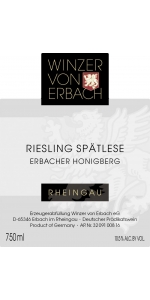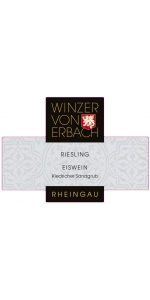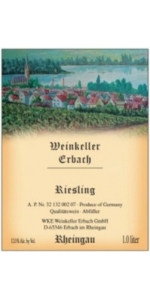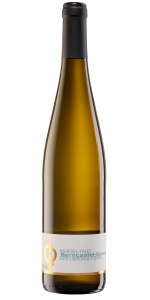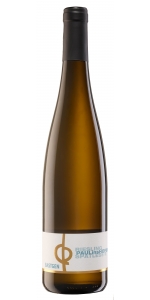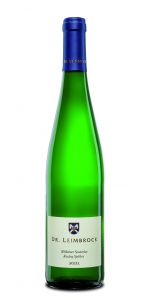Winzer Von Erbach Riesling Rheingau Erbacher Honigberg Spatlese 2015
| Country: | Germany |
| Region: | Rheingau |
| Winery: | Winzer Von Erbach |
| Grape Type: | Riesling |
| Vintage: | 2015 |
| Bottle Size: | 750 ml |
Honeyed style, rich minerality and luscious creaminess. Flavors of baked pineapple and pear. Fresh and juicy on the finish.
From the famous Erbacher Honigberg vineyard. Average of the vines is 20 years old.
Cool fermentation, matured on the lees for 2 months before bottling, with a slight filtration.
Riesling Rheingau Erbacher Honigberg Spatlese goes well with Indian Curry and blue Cheese
Winzer von Erbach Riesling Eiswein is made from 100 percent Riesling.
The Eiswein has aromas of concentrated yellow fruit and a fruity sweetness. It's a high end product with a very long aging potential.
The grapes were picked frozen which resulted in a concentration of sugar, acidity and aromas and a low yield.
Pairs with blue cheese, fois gras, French apple cake.
Weinkeller Erbach Riesling (liter) is 100 percent Riesling.
Round and refreshing wine with light touches of lemon and lime on the nose. Slightly sweet mouthfeel, with juicy and fruity flavors.
Bastgen Berncastel-Cueser Weisenstein Riesling Spatlese Trocken is made from 100 percent Riesling.
Bright, clean, fresh and zesty. Grapefruit like flavors. Fruity aromas and a nice minerality, typical of the Riesling grape grown on blue slate soil. Round, rich and a very long finish. The grapes for this wine are vigorously selected. Botrytis is not tolerated. At harvest the grapes are fully ripened, have a golden color, and a soft tartness. After a long spontaneous fermentation in a traditional 1000L barrel, the wine just reaches the dry stage. This gives the wine a creamy structure that interplays with ripe yellow and exotic fruit aromas.
They meticulously tend 4.5 ha (11.11 acres) of which 80% is Riesling. The soil is made of slate. Their vineyards are located in Kesten and Brauneberg, on a steep terrace, and planted to 50-year old vines. Fortunately for Bastgen, they own part of the famous Brauneberger Juffer Sonnenuhr. The vines produce very small, ripe berries that are very tasty.
Review:
"This dry Mosel riesling is GG in all but name! Complex nose of white peach and red-fleshed vineyard peach with herb garden notes. Very elegant and polished this glides over your palate, the precision of flavor on the medium-bodied palate is very impressive. Then comes the wet stone and red berry finish that doesn’t want to stop. From organically grown grapes. Drink or hold."
- James Suckling (November 2023), 95 pts
Bastgen Kestener Paulinshofberg Riesling Spatlese is 100 percent Riesling.
Yellow color with green highlights.
Beautiful peach aromas on the nose, rich and ripe fruits on the mouth with a refreshing acidity and honey notes. A very pleasing wine.
They meticulously tend 4.5 ha (11.11 acres) of which 80% is Riesling. The soil is made of slate. Their vineyards are located in Kesten and Brauneberg, on a steep terrace, and planted to 50-year old vines. Fortunately for Bastgen, they own part of the famous Brauneberger Juffer Sonnenuhr. The vines produce very small, ripe berries that are very tasty.
Dr. Leimbrock Mulheimer Sonnenlay Riesling Spatlese is made from 100 percent Riesling.
A classic in the residual sweet range that impresses with filigree fruit and mineral spiciness.
The circulating mountain "Mülheimer Sonnenlay" represents a geographical feature of the Moselle. Due to the strong meandering of the Moselle, the mountain was surrounded by the course of the river in geological development in such a way that a so-called circulating mountain arose from it. Located in the northeast-southwest direction, vines are cultivated on both sides of the mountain. The site name "Sonne" and "Lay" (Mosel Franconian for slate) combines the most important prerequisites for the cultivation of Riesling vines. Soils are skeletal-rich, weathered clay-ish shale enriched with sand, stones, and clay. At the beginning of the 1930s, the Mülheim winegrowers proudly pointed out that the local wine was served in the elegant restaurant of the airship "Graf Zeppelin" on its world trips and was obviously very popular.
Pair with spicy dishes, soft cheese, cakes.
Honeyed style, rich minerality and luscious creaminess. Flavors of baked pineapple and pear. Fresh and juicy on the finish.
From the famous Erbacher Honigberg vineyard. Average of the vines is 20 years old.
Cool fermentation, matured on the lees for 2 months before bottling, with a slight filtration.
Riesling Rheingau Erbacher Honigberg Spatlese goes well with Indian Curry and blue Cheese
Review:
"The 2015 Riesling Rheingau Honigberg Spätlese is a terrific value as well as an outstanding wine. Offering notable purity in its quince, sugared citrus, and minty aromas and flavors, it’s medium-bodied, with bright, piercing acidity, good depth of fruit, and a clean, crisp finish. It’s going to shine on the dinner table and should evolve nicely."
- Jeb Dunnuck (March 27th 2019), 90 pts
The Winzer Von Erbach Estate
The wine-growers association was founded in 1897. Today 45 vintners deliver grapes from the Erbach and Kiedrich vineyards to the cellar. There is close a relationship with the vintners, who are all part owners of their winery, all of whom have access to highly skilled and experienced viticultural advice. The cellar was built in 1903 in the "Art Nouveau" style. Today they are the most highly rated Wine cooperation in the Rheingau region, well known for producing high quality Riesling wines with a strong price-value relationship.
The Winzer Von Erbach Vineyard
Together with the Mosel region, Rheingau is famous for growing top quality grapes of the best German white wine varietal, the Riesling. With 3,200 hectares (7,904 acres) in a 45 kilometer stretch from Wiesbaden to Lorchhausen, it is one of the smaller wine regions in Germany.
More than 30% of their vineyards are located in the top spots of the Rheingau called "erstes Gewächs" (first growth). 50 hectares are cultivated in the following locations in Erbach and Kiedrich: Erbacher Michelmark: (12 hectares), Erbacher Steinmorgen: (8 hectares), Erbacher Honigberg: (20 hectares), Kiedricher Sandgrub: (10 hectares).
- back
Mordoree Cotes du Rhone Rouge La Dame Rousse is made from 40% Grenache, 35 % Syrah, 15% Cinsault, 5% Carignan, 5% Counoise.
100 % destemming, 15 day maceration with a maximum of 30° C temperature
Deep red color. Blackcurrant and violet aromas. Melted and fine tannins, good finish.
Food pairing: cold meats and delicatessen, grilled meats, semi-mature cheeses.
Manoir du Carra Bourgogne Blanc Le Soly is made of 100% Chardonnay. Average 50 year old vines.
The nose shows step by step fruity, smoky and mineral aromas. A slight oaky hint in the end with a lingering finish: those are typical Chardonnay aromas.
The wine is estate bottled.Ageing is done on fine lees during 3 to 5 months. About 40% of the wine has its alcoholic and malolactic fermentation in oak barrels (new, one, two or three wine barrels) with a weekly “Bâtonnage” (lee stirring) during 6 months. In the end, the wine in the barrels is blended with the wine in vats. Manual harvest of very ripe grapes. Selection of the best grapes on a vibrating sorting table, light pressing. The alcoholic fermentation takes place in cold stainless-steel vats.


